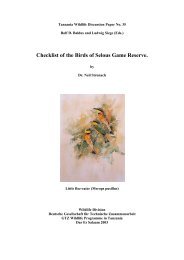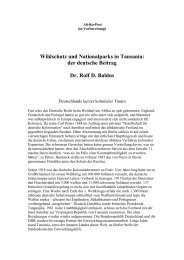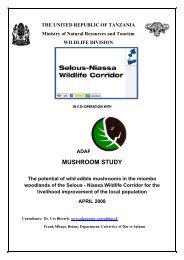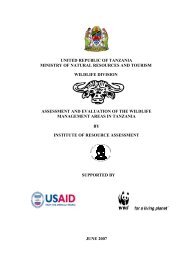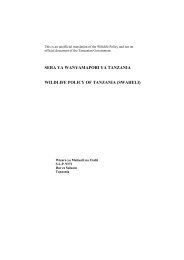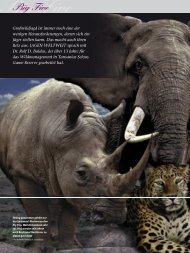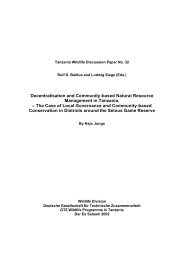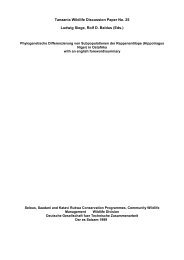African Indaba Articles - wildlife-baldus.com
African Indaba Articles - wildlife-baldus.com
African Indaba Articles - wildlife-baldus.com
Create successful ePaper yourself
Turn your PDF publications into a flip-book with our unique Google optimized e-Paper software.
Romantics may talk about the wisdom of nature regulating itself, including <strong>wildlife</strong> numbers, yet Kenyansdo not want <strong>wildlife</strong> to interfere with agriculture. This is the view held by the farming and pastoralistpopulations, including their representatives such as Laikipia West MP Mr GG Kariuki, who, in initiating the<strong>wildlife</strong> policy review process, pointed out that <strong>wildlife</strong> and agriculture do not mix.The only people who appear to want <strong>wildlife</strong> roaming and multiplying freely outside protected areas areAwori and foreign animal welfare organizations, animal rights' activists, Chandaria and groups of urbanKenyans who are not threatened by human-animal conflicts. But Kenyans, who suffer the brunt of <strong>wildlife</strong>invasion and damage, fence, dig ditches and use all manner of deterrents - fires, spotlights, noise bombs andchemicals - to deny habitat to wild animals.Millions of shillings are spent to translocate animals from areas where wise nature has allowed them tomultiply to the detriment of man, their own environment and even their future. The sad thing is that <strong>wildlife</strong>numbers continue to decline because of the failure of policy, precisely the kind Western animal welfareNGOs have pressed on Government over the years.Kenya has lost about 60 per cent of its <strong>wildlife</strong> in 40 years. Lately, the destruction has accelerated. Whilepoliticians and NGO chiefs organize workshops and symposia to talk endlessly on nature, our stewardship,biodiversity, heritage and so forth, <strong>wildlife</strong> is being exterminated.It is being chased, shot, trapped, speared, snared and poisoned in increasing numbers. The situation isaggravated by the large game on non-protected land [where it is] at the mercy of landowners. Only a fractionof the non-protected <strong>wildlife</strong> areas are suitable for tourism.As long as the people, who presently <strong>com</strong>pete with <strong>wildlife</strong>, do not have direct legally obtainable benefits,they will continue to destroy it. If the current trends are extrapolated, it is likely that by the time Kenya Vision2030 is supposed to be realized, there will be hardly any <strong>wildlife</strong> left in the non-protected areas.Policy failure is the result of foreign <strong>wildlife</strong> NGOs, their local acolytes and successive governments,including their agencies such as the Kenya Wildlife Service (KWS).Unless <strong>wildlife</strong> is well taken care of, it will disappear. Wildlife husbandry means looking after game so thatit thrives and only then can it be harvested. The regions suitable for <strong>wildlife</strong> would be teeming with game ifhusbandry was allowed on a sound business footing.Wildlife husbandry would make more money for Kenya than flowers do and at the same time beenvironmentally sound and help rehabilitate devastated land. Yet the Vice-President, who spoke of nature sowarmly and seemed to have made promises in return for gifts, pledges which prejudice the out<strong>com</strong>e of theongoing <strong>wildlife</strong> policy review, also dwelt on management.Contradicting himself, he called on KWS to "scientifically manage animals". Indeed! What is required isscientific and economic management of <strong>wildlife</strong>. Having left matters to "nature" for decades, we lost morethan half of our <strong>wildlife</strong>, incurred enormous environmental damage and paid an incalculable opportunity cost.The <strong>wildlife</strong> policy struggle is increasingly tedious. What is so galling is that, by ignoring the plight of thepeople and neglecting their interests, the animal rights' and welfare groups hurt the people and <strong>wildlife</strong>.Instead, Kenya promises to continue with a policy that has obviously failed in exchange for paltry gifts.Lake Nakuru is drying up; Lake Naivasha is dying as is Lake Victoria. Silting is rife in Lake Baringo and LakeTurkana is shrinking. The Government excises forests and settles people, allows invasion of protected areasand contemplates destroying <strong>wildlife</strong> habitat for dodgy sugar business. Turning attention to short<strong>com</strong>ings ofenvironmental policies would be more useful than sentimental foreign philosophies.This article first appeared in “The East <strong>African</strong> Standard” (Nairobi) on November 28, 2006112



